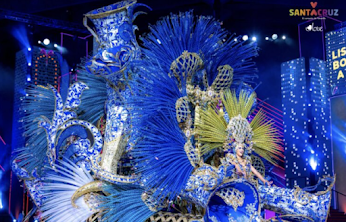El entierro de la Sardina - The end of Carnival season

Today, as well as being Ash Wednesday - Miércoles de Ceniza - in Spain we celebrate The burial of the Sardine - El entierro de la Sardina. But, what is this exactly, and why do we celebrate it on a day like today? Well, it is important to mention that, for the last five days, Spanish people have been celebrating the festivity of Carnival. People dress up, dance, and take part in parades and fancy dress contests. El entierro de la Sardina marks the end of the festival and introduces Cuaresma or Lent. Carnival in the Canary islands. Credit: Radio televisión Canaria The burial of the Sardine consists in a parade where participants pretend to be sad and cry. They accompany a giant sardine generally made of cardboard and walk it around the area. At the end of the parade, the sardine is burnt. In some places, attendees can enjoy some fish that is cooked in the fire and there are bands playing some music. A sardine being burnt. Credits: elplural
